Social media plays a predominant role in teenagers’ lives. It influences their self-esteem, mental health, and social skills. While these platforms offer unique opportunities for expression and connection, unregulated use can also pose risks. Thus, encouraging a balanced and thoughtful use of social media is essential.
Negative Impacts of Social Media
More than 1 in 4 minors may be subject to screen addiction
(According to a meta-analysis by researchers at the Institute of Child Health, University College of London).
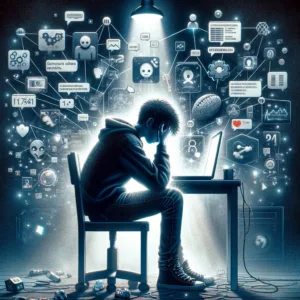 According to PEW (Pew Research Center, US), 59% of American teenagers have been victims of cyberbullying.
According to PEW (Pew Research Center, US), 59% of American teenagers have been victims of cyberbullying.
- 42% insults
- 32% spreading rumors unknowingly
- 25% receiving sexual images
- 21% messages from unknown adults asking for personal info
- 16% physical threats
Patricia Conrod, a professor in the Department of Psychiatry and Addictology at the University of Montreal and a researcher at CHU Sainte-Justine, her research on 3,800 Montreal teenagers over five years shows that an increase in social media use among youth is directly associated with a decrease in self-esteem and an increase in symptoms related to eating disorders.
“These young people can be exposed to a reality that is extremely biased, putting them at risk of concluding that their life and physical appearance are less good than everything they see on social media”
she explains.
Mental Health
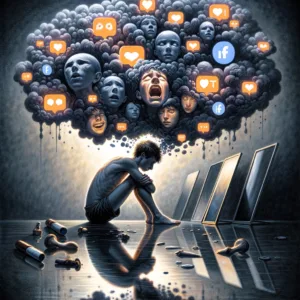 Excessive use of social media has been linked to various mental health issues, such as anxiety, depression, and Attention Deficit Hyperactivity Disorder (ADHD). The addictive nature of the platforms, with their constant notifications and endless content flow, can contribute to compulsive use, reducing time dedicated to rest and more enriching activities. Furthermore, cyberbullying, facilitated by anonymity on the Internet, can have serious repercussions on adolescents’ psychological well-being.
Excessive use of social media has been linked to various mental health issues, such as anxiety, depression, and Attention Deficit Hyperactivity Disorder (ADHD). The addictive nature of the platforms, with their constant notifications and endless content flow, can contribute to compulsive use, reducing time dedicated to rest and more enriching activities. Furthermore, cyberbullying, facilitated by anonymity on the Internet, can have serious repercussions on adolescents’ psychological well-being.
Examples of pathologies and psychological problems that can stem from this dynamic:
- Body Dysmorphia: Body dysmorphia is a disorder characterized by an obsession with a perceived flaw in physical appearance, often imaginary or minor in others’ eyes. Social media, with its focus on physical appearance and often unattainable beauty standards, can exacerbate this disorder by pushing users to obsessively compare their appearance to others, leading to bodily dissatisfaction and a relentless pursuit of perfection.
- Eating Disorders: Eating disorders, such as anorexia and bulimia, can be influenced by a negative perception of one’s own body, often exacerbated by idealized images on social media. Young people, seeking approval and social validation, may adopt harmful eating behaviors in an attempt to achieve a physical ideal promoted by these platforms.
- Depression and Anxiety: Studies show a correlation between excessive social media use and increased symptoms of depression and anxiety. Constant comparison of one’s own life to those seemingly perfect lives presented online can lead to feelings of loneliness, inadequacy, and failure, contributing to the emergence or aggravation of these disorders.
- Self-esteem Issues: Although not always recognized as a pathology in itself, low self-esteem is a major issue that can be exacerbated by social media. This can lead to increased dependency on online approval and validation to feel valued, creating a vicious cycle where self-esteem becomes increasingly fragile and dependent on external perceptions.
Léonie K is a French YouTuber who popularizes psychology, various trends, and social media to help us understand. We invite you to check out her work: Léonie K
Social Skills: Empathy
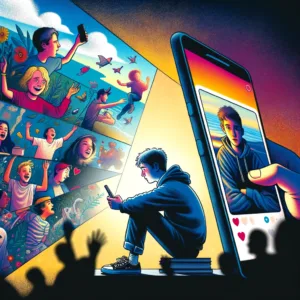 Although social media offers a platform to connect with others, it can also negatively affect the development of social skills in young people. Online interactions, often lacking the nuances of face-to-face communication, do not always allow for the development of skills such as empathy, emotion recognition, and conflict management. This can lead to a decreased ability to establish meaningful interpersonal relationships in real life.
Although social media offers a platform to connect with others, it can also negatively affect the development of social skills in young people. Online interactions, often lacking the nuances of face-to-face communication, do not always allow for the development of skills such as empathy, emotion recognition, and conflict management. This can lead to a decreased ability to establish meaningful interpersonal relationships in real life.
The impact of social media on the development of empathy in teenagers is a growing interest for researchers in social psychology and developmental psychology. Empathy, the ability to understand and share the feelings of others, is crucial for the development of social skills and for establishing healthy interpersonal relationships. Social media, by altering how social interactions occur, also influences the development and expression of empathy.
Reduction in Face-to-Face Interactions
Social media promotes distant interactions, often at the expense of in-person meetings. Face-to-face conversations involve non-verbal cues such as tone of voice, facial expressions, and body language, which play a crucial role in understanding others’ emotions and expressing empathy.
Dehumanization and Anonymity
Social media can sometimes create a sense of anonymity or social distancing, where users feel less accountable for their actions online. This dehumanization can reduce inhibitions against aggressive behavior or cyberbullying, diminishing the capacity to feel empathy for the victims of these acts. Moreover, regular exposure to hate speech or aggressive behaviors online can normalize these attitudes, further weakening empathy.
Social Comparison and Jealousy
Social media creates an environment where teenagers are constantly exposed to idealized images of others’ lives
, leading to negative perceptions of their own lives and body image, thus harming their self-esteem. Studies show that frequent exposure to these images can increase feelings of inadequacy and anxiety among young users. We’ve already dedicated an article to self-esteem, to read it: Click here!
The tendency to compare can lead to feelings of jealousy and envy, eroding empathy towards others as well.
 Empathy Development
Empathy Development
Despite these challenges, social media also has the potential to foster empathy. It allows exposure to a diversity of experiences and perspectives, which can broaden users’ understanding and sensitivity to others’ realities. When used consciously and thoughtfully, social media can sometimes serve as platforms for sharing personal experiences and mutual support, strengthening the ability to experience empathy.
Encouraging Balanced Use of Social Media
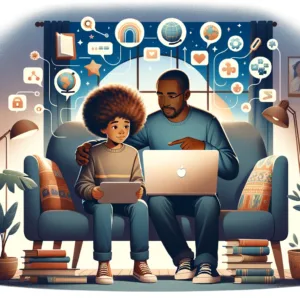 To mitigate these effects, it’s crucial to promote a conscious and critical use of social media. Users should be encouraged to recognize the often artificial and staged nature of online content. Additionally, media education that includes discussions about self-image, self-esteem, and mental health can play a key role in prevention. Encouraging teenagers to cultivate interests and relationships outside of social media can also contribute to a healthier self-image and overall well-being.
To mitigate these effects, it’s crucial to promote a conscious and critical use of social media. Users should be encouraged to recognize the often artificial and staged nature of online content. Additionally, media education that includes discussions about self-image, self-esteem, and mental health can play a key role in prevention. Encouraging teenagers to cultivate interests and relationships outside of social media can also contribute to a healthier self-image and overall well-being.
Some Recommendations:
- Set Time Limits: Establish time slots for using social media. Leave enough time for other enriching activities such as creative hobbies, sports, and family interactions.
- Promote Active Participation: Encourage your teenagers to learn new skills and interact constructively on social media.
- Discuss Realities vs. Representations: Educate your teenagers about the differences between real life and the often idealized representations on social media. This dialogue can help them develop a positive body image and handle social comparisons healthily.
- Strengthen Resilience to Cyberbullying: Equip your teenagers with the necessary tools to deal with cyberbullying, including how to recognize it, respond constructively, and where to find help.
- Support Learning of Social Skills Off Screens.
 Dialogue is Your Ally.
Dialogue is Your Ally.
Strengthen your relationship with your teenagers while helping to protect them. Digital technology can also be an ally, transforming the online experience into a healthier one. There are many educational apps available that can promote curiosity and learning. We have dedicated an article to this topic, available via this link.
Conclusion
While the challenges posed by social media and excessive screen use are undeniable, it’s essential also to recognize the positive potential of technology. Screens are not merely gateways to superficial distractions. They can also be catalysts for curiosity and valuable learning tools. In a constantly evolving digital world, finding the right balance between beneficial and harmful use is crucial.
Screens and social media offer unprecedented access to a wealth of knowledge, allowing young people to explore topics they’re passionate about, develop new skills, and engage in supportive communities. They can stimulate innovation, encourage creativity, and facilitate self-directed learning. Moreover, when used thoughtfully, they can enhance social relationships by providing additional means of connection and sharing.
Parents, educators, and the youth themselves play a crucial role in this balance, promoting healthy digital habits, setting reasonable screen use limits, and encouraging offline enriching activities.
Promoting media and information education is also essential to help young people navigate the digital landscape discerningly. It’s important to teach them to recognize quality content and use social media positively and empathetically. The goal is not to demonize screens but to integrate them wisely into our lives, acknowledging both their advantages and limitations. This is a topic we will address in an upcoming article.
Through a balanced and thoughtful approach, we can transform our relationship with technology, turning it from mere distractions into powerful tools for exploration, learning, and connection.
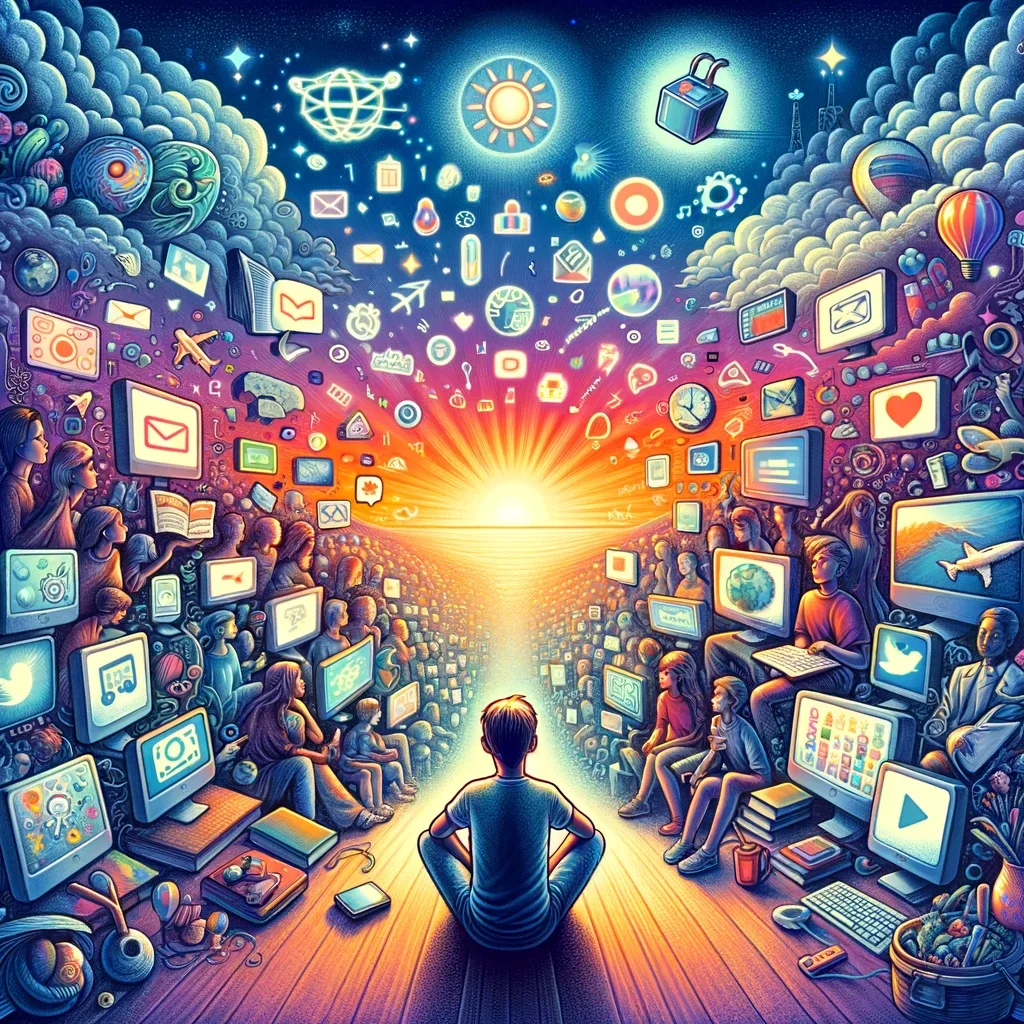
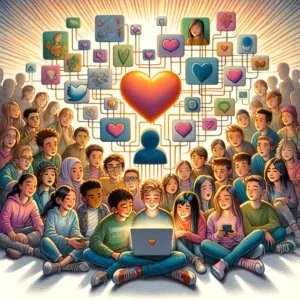 Empathy Development
Empathy Development